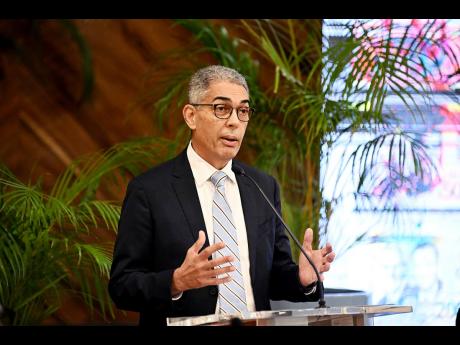BOJ concerned about labour
THE FALL in Jamaica’s labour productivity concerns the Bank of Jamaica (BOJ), which now sees inflation cooling down in 2025 towards the target range, rather than this year.
“The domestic labour market remains very tight,” said BOJ Governor Richard Byles in his address at the quarterly press briefing held on Wednesday.
The country is virtually at full employment with those looking for work at 4.2 per cent of the labour force in October.
While employment is good, the value to the overall economy remains mixed.
As Byles puts it, the strong employment growth has outpaced that of the wider economic growth, which suggests a decline in labour productivity.
“Combined with the real wage adjustments that have occurred recently, this fall in productivity continues to be of some concern,” he added.
A country increases its productivity when its labour can produce more with the same or less resources.
Critics, however, argue that productivity needs to be balanced with making allowances for workers getting a liveable wage.
Specifically, productivity in the island dipped at an average rate of 0.8 per cent each year between 2018 and 2022, according to the Economic and Social Survey Jamaica (ESSJ) published by the Planning Institute of Jamaica.
The decline during the period was due to the employed labour force growing at 2.0 per cent or a higher rate than 0.5 per cent real gross domestic produc over the period, according to the ESSJ.
Inflation over 12 months ending January hovered at 7.4 per cent or above the target range of 4.0 to 6.0 per cent. The expectation was to get inflation within the range this year – not any more.
Byles expects inflation to remain “above the bank’s target range of until June 2025”.
He cited the main factors as the two-part rise in public passenger vehicle fares effective October 2023 and April 2024, as well as the effect of public sector and private sector wage increases throughout the economy.
“Largely because of the impact of the temporary price shocks,” he said.
The inflation outturn also reflected high agricultural food inflation. Partly offsetting the impact of these factors was a reduction in Jamaica Urban Transit Company fares.
The BOJ’s Monetary Policy Committee met earlier in February and agreed to maintain the policy interest rate; and to maintain stability in the foreign exchange market.
The policy rate is the rate that the BOJ offers to banks and other deposit-taking institutions. The BOJ since 2021 has increased its benchmark policy rate from 0.5 per cent to 7.0 per cent after a series of rate hikes. The higher rates are to attract funds towards saving and away from inflationary consumption.
“Risks to inflation and its outlook remain elevated,” said Byles.
The BOJ is one of many global central banks that have hiked rates to stem inflation, since the onset of the pandemic.
Economists generally blame supply chain bottlenecks that pushed up prices for commodities and also freight shipping costs. But other economists also cite the impact of government household grants, and stimulus plans during that period.

